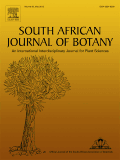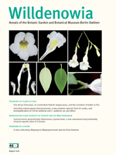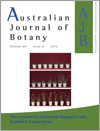
Botanical Studies
Scope & Guideline
Promoting Accessible Knowledge in Plant Studies
Introduction
Aims and Scopes
- Plant Genetics and Genomics:
Research on genetic variations, gene mapping, and genomic technologies applied to crop improvement and plant resilience against environmental stresses. - Ecophysiology of Plants:
Investigations into how plants respond to abiotic factors such as light, temperature, and soil conditions, focusing on physiological adaptations and metabolic processes. - Plant Taxonomy and Systematics:
Taxonomic revisions and phylogenetic studies aimed at understanding plant diversity, classification, and evolutionary relationships among species. - Ecological Interactions and Biodiversity:
Exploration of plant interactions with pollinators, pathogens, and other organisms, including studies on plant community dynamics and conservation strategies. - Biotechnology and Applications:
Utilization of biotechnological tools for enhancing plant traits, such as stress resistance and bioactive compound production, with implications for agriculture and medicine. - Fungal and Microbial Interactions:
Research focusing on the roles of fungi and microbes in plant health, including mutualistic and pathogenic relationships that affect plant growth and development.
Trending and Emerging
- CRISPR and Genetic Engineering:
An increasing number of studies utilizing CRISPR technology to enhance crop traits and address food security challenges, indicating a trend towards innovative genetic manipulation. - Sustainable Agriculture and Stress Mitigation:
Research focusing on strategies for improving plant resilience to environmental stresses such as salinity and drought is becoming more prominent, showcasing the journal's commitment to sustainability. - Bioactive Compounds in Plants:
A growing interest in the extraction and application of bioactive compounds from plants for health and wellness, reflecting a broader trend in pharmacognosy and natural products research. - Machine Learning in Plant Research:
The application of machine learning techniques to analyze plant responses and traits is emerging as a significant theme, highlighting the intersection of technology and botany. - Plant-Microbe Interactions:
Research on the synergistic relationships between plants and microbes, including endophytes and mycorrhizae, is increasingly featured, emphasizing the importance of these interactions for plant health.
Declining or Waning
- Traditional Medicinal Plants:
Research on traditional uses of medicinal plants has decreased, possibly due to a growing emphasis on modern biotechnological approaches and synthetic alternatives. - Historical Plant Studies:
Studies focusing on historical perspectives of plant uses and classifications appear to be waning as the journal shifts towards contemporary and applied research. - Morphological Studies:
While still relevant, purely morphological studies without molecular or ecological context have seen a reduction, as integrative approaches gain more attention.
Similar Journals

Botany
Exploring the depths of ecology and evolution.Botany is a premier academic journal published by Canadian Science Publishing, dedicated to advancing the understanding of plant sciences and ecological systems. With an ISSN of 1916-2790 and an E-ISSN of 1916-2804, this journal has established itself as a respected publication in the fields of Ecology, Evolution, Behavior and Systematics, and Plant Science, reflected in its 2023 Q2 and Q3 rankings. Covering a wide range of topics, Botany is committed to fostering interdisciplinary research, promoting innovative methodologies, and disseminating significant findings from both theoretical and applied perspectives. Based in Ottawa, Canada, the journal is open access, ensuring that high-quality research is accessible to a global audience, thereby playing a crucial role in the dissemination of knowledge in the scientific community. With convergence years from 2008 to 2024, it continues to evolve alongside the scientific advancements in botanical studies, making it an essential resource for researchers, professionals, and students alike.

Botanical Sciences
Advancing plant knowledge for a sustainable future.Botanical Sciences, published by SOC BOTANICA MEXICO, is a pioneering open access journal dedicated to advancing the field of plant science. Established in 2012, it has rapidly become an essential resource for researchers and professionals interested in the diverse aspects of botany, including plant biology, ecology, and conservation. With an ISSN of 2007-4298 and an E-ISSN of 2007-4476, the journal operates under a vision to foster the exchange of knowledge and innovations among scientists globally. Recognized in the Q3 quartile for plant science in 2023 and ranking at #304 out of 516 in the Scopus category for Agricultural and Biological Sciences, Botanical Sciences is strategically positioned to widen its reach and impact. The journal's commitment to open access ensures that research findings are freely available to an international audience, providing invaluable insights and fostering collaboration within the botanical sciences community. The editorial board comprises leading experts who are dedicated to maintaining high-quality peer review processes to uphold the standards expected by the academic community.

Egyptian Journal of Botany
Empowering researchers to shape the future of botany.Egyptian Journal of Botany is a premier publication in the field of botanical sciences, encompassing agricultural research, plant biology, and ecology. Published by the NATL INFORMATION DOCUMENTATION CENT, ACAD SCIENTIFIC RESEARCH & TECHNOLOGY in Egypt, this journal has made significant strides since its establishment, now recognized within several prestigious Scopus quartiles including Q3 in Agronomy and Crop Science, and Q3 in Ecology, reflecting its impact and relevance in the scientific community. With an aim to disseminate high-quality research and foster innovation in plant sciences, the journal provides a platform for researchers, professionals, and students alike to share vital findings and advancements. Although it currently operates under traditional access, the wealth of knowledge it offers is pivotal for those engaged in ecological preservation, crop improvement, and biotechnological applications. With its comprehensive scope and evolving reputation, the Egyptian Journal of Botany is poised to remain an influential player in the botanical sciences from 2019 to 2024 and beyond.

BRITTONIA
Elevating Plant Science Research Since 1931BRITTONIA, published by Springer, stands as a reputable journal dedicated to advancing the fields of botany and plant sciences. With a storied history dating back to 1931, this journal has evolved to embrace contemporary research spanning various aspects of plant biology, ecology, and systematics. Focusing on a comprehensive analysis of both ecological interactions and plant systematics, BRITTONIA plays a crucial role in disseminating knowledge among researchers and professionals committed to understanding plant life and its environmental contexts. Despite its open access status being currently unavailable, the journal ensures wide accessibility through institutional subscriptions. In the latest rankings, it proudly holds a Q2 category in Plant Science and a Q3 category in Ecology, Evolution, Behavior, and Systematics, indicating its growing influence and academic rigor. Researchers and students alike will find BRITTONIA an essential resource for the latest findings and discussions in plant sciences.

SOUTH AFRICAN JOURNAL OF BOTANY
Fostering Growth in the Field of BotanyThe SOUTH AFRICAN JOURNAL OF BOTANY, published by Elsevier, is a distinguished peer-reviewed journal that serves as an essential platform for the dissemination of high-quality research in the field of plant science. With an ISSN of 0254-6299 and an E-ISSN of 1727-9321, this journal has been a vital contributor to the scientific community since its inception in 1982, continuing to publish pivotal research findings up to 2024. Recognized in the Q2 category of Plant Science for 2023, and ranked 106 out of 516 in Scopus, this journal occupies the 79th percentile in its field, reflecting a strong commitment to advancing botanical sciences. Although it is not an open-access publication, it provides crucial insights and advancements that benefit researchers, professionals, and students alike. As the journal continues to evolve, it remains an invaluable resource for those dedicated to exploring the complexities of plant biology within the broader scope of agricultural and biological sciences.

Brazilian Journal of Botany
Cultivating knowledge in the heart of botany.The Brazilian Journal of Botany, published by SOC BOTANICA SAO PAULO, stands as a vital resource in the field of plant sciences, particularly noted for its contributions to agricultural and biological research. With an ISSN of 0100-8404 and an E-ISSN of 1806-9959, this journal has established a robust presence since its inception, continuing to foster growth in botanical research through its anticipated publications from 2006 to 2024. Ranking in the second quartile (Q2) in Plant Science and positioned at 207 out of 516 within Scopus rankings, the journal demonstrates both quality and relevance, occupying the 59th percentile in its category. As an essential platform for scholars, practitioners, and students alike, it disseminates original research, reviews, and advancements within plant biology, thereby promoting understanding and innovation in plant sciences. While the journal currently does not offer open access, its rich content remains pivotal for those invested in the intricacies of botanical science.

TURKISH JOURNAL OF BOTANY
Innovating the future of plant research.Welcome to the TURKISH JOURNAL OF BOTANY, a prestigious publication dedicated to advancing the field of plant science. Established in 1990 and published by the Tubitak Scientific & Technological Research Council Turkey, this journal serves as a vital platform for researchers, professionals, and students to disseminate their findings and insights on various botanical topics. With an impressive H-index that underscores its academic influence and recognition in the field, the journal is positioned in the Q2 quartile of plant science according to the latest category rankings. The ISSN of the journal is 1300-008X and the E-ISSN is 1303-6106, ensuring broad accessibility in both print and digital formats. As of 2023, it ranks #213 out of 516 in Scopus for Agricultural and Biological Sciences, placing it in the 58th percentile, which highlights its competitive standing among botanical journals. Researchers are encouraged to engage with its open-access options where available, fostering a collaborative and accessible research environment. With its commitment to quality and scientific rigor, the Turkish Journal of Botany remains an essential resource for anyone engaged in the exploration of plant sciences.

Willdenowia
Elevating research in botany and beyond.Willdenowia is a prestigious scientific journal published by the Botanischer Garten & Botanische Museum Berlin-Dahlem, dedicated to advancing the field of botany and plant sciences. With an ISSN of 0511-9618, this journal has established itself as a crucial platform for researchers, practitioners, and students interested in ecology, evolution, behavior, systematics, and plant science. The journal boasts an impactful reputation, evidenced by its impressive Q1 and Q2 quartile rankings in Plant Science and Ecology, Evolution, Behavior and Systematics respectively, as well as notable Scopus rankings, placing it within the top quartiles of its categories. Although access is not open, articles published in Willdenowia contribute significantly to the global body of botanical research, making it an essential resource for anyone looking to deepen their understanding of plant biology and related ecological disciplines. The journal has continuously evolved since its inception and aims to facilitate interdisciplinary collaboration and knowledge dissemination in the life sciences.

TELOPEA
Elevating Knowledge in Ecology and Plant SciencesTELOPEA is a distinguished scholarly journal published by the Natl Herbarium New South Wales, focusing on the rich fields of Ecology, Evolution, Behavior, and Systematics, as well as Plant Science. With an ISSN of 0312-9764 and an E-ISSN of 2200-4025, the journal has been a significant contributor to the understanding of plant biodiversity and ecosystem dynamics since its inception in 1984, with regular publication resuming in 2006 through to 2024. Residing in the beautiful Australian Botanic Garden at Mount Annan, NSW, TELOPEA operates under a Q3 ranking for both Ecology and Plant Science as of 2023, reflecting its relevance and contribution to these critical scientific disciplines. Though it does not offer open access, the journal remains an essential resource for researchers and professionals seeking to contribute to and stay abreast of the latest developments in plant sciences and ecological research. With a commitment to rigorous peer review and the dissemination of high-quality research, TELOPEA stands as a vital platform for advancing knowledge in the realm of plant ecology and systematics.

AUSTRALIAN JOURNAL OF BOTANY
Connecting researchers to the heart of plant biodiversity.The Australian Journal of Botany is a prestigious peer-reviewed journal published by CSIRO PUBLISHING, dedicated to advancing the field of plant sciences and ecology. Established in 1953, this journal provides a critical platform for researchers to share original research findings, reviews, and perspectives in subjects ranging from plant biology to ecological interactions, with a focus on Australian flora and its conservation. With an impressive impact factor and categorized in the Q3 quartile in both Ecology, Evolution, Behavior and Systematics and Plant Science, the journal ranks competitively within its fields, allowing authors to reach a diverse audience of professionals, students, and fellow researchers. The journal is accessible in print and electronically through its ISSN: 0067-1924 and E-ISSN: 1444-9862, providing wider access to vital research outcomes that influence environmental policies and natural resource management. As it aspires towards innovation and excellence, the Australian Journal of Botany remains an essential resource for those passionate about the richness of plant biodiversity and ecological understanding.